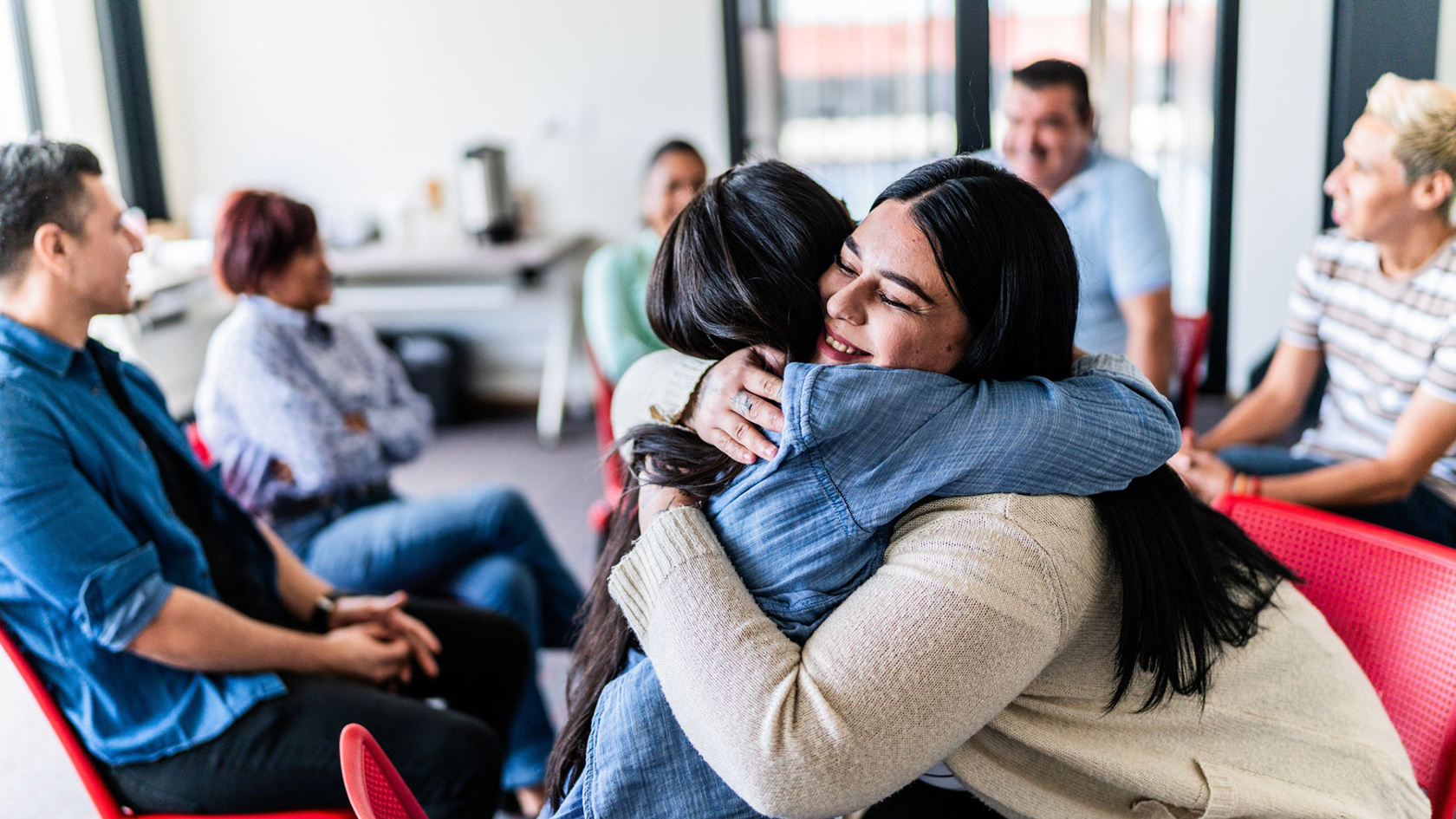Substance use disorder (SUD) can leave you feeling alone, defeated, and hopeless. Couple that with the physical consequences of substance use as well as the mental health impacts, and you could feel as if your life has no direction or purpose. That’s why addressing each of the components that can contribute to SUD is so important, both for beginning and maintaining recovery.
Both individual and group therapy can greatly improve the lives of those with SUD, and both come with their own advantages. If you or a loved one are struggling to navigate the recovery process, therapy may help you address the underlying causes of your disorder, as well as give you tools to manage the urge to use.
What Is Individual Therapy?

Individual therapy occurs when the therapist works one-on-one with an individual to address their thoughts, emotions, concerns, and more. The therapist may be a social worker, counselor, psychiatrist, or another similar professional. While individual therapy is often compared to seeking advice from your friends and family, this isn’t quite the case. Individual therapy is a professional service provided by someone who is trained to work with clients dealing with SUD or mental health disorders.
At your first session, you and your therapist will create a plan for addressing your SUD as well as any trauma or mental health symptoms that have either contributed to or arose from SUD. This plan is based on your unique needs, conditions, traumas, and what triggers your SUD symptoms. Creating a personalized plan ensures both you and your therapist can understand and trust one another during the therapeutic process.
Individual Therapy and Addiction RecoveryM
Facing the emotions surrounding SUD is no small feat, and it’s normal to feel uneasy about discussing your substance use. However, individual therapy provides a safe place for you to discuss SUD, trauma, abuse, and more. Together, you and your therapist can develop a better understanding of all the things that have contributed to substance use. If you can explore and determine the root cause of your SUD, your therapist can help you take accountability for your actions. You and your therapist will both work diligently to find healthier options for dealing with stress.
Individual therapy is also important because research indicates its effectiveness. Proven individual therapy methodologies, like cognitive behavioral therapy (CBT), have been shown to improve your ability to refrain from substances by guiding you to replace negative thoughts with helpful ones and learn new, positive behaviors. Practicing your behaviors when faced with triggering stimuli may help prevent relapse and improve your behaviors outside of the therapist’s office.
Benefits of Individual Therapy
Individual therapy during addiction treatment can have many benefits.
Here are some of the most crucial.
Learning Your Triggers
It can be difficult to identify the specific circumstances that trigger the overwhelming emotions and cravings associated with substance use. As you open up to your therapist, you can work together to recognize the emotional and physical symptoms caused by these circumstances, as well as the specifics of what triggers this response.
In short, if you can determine what situations, people, or places can lead to the desire to use substances, you can also learn techniques for avoiding them or addressing the situation with a healthy coping mechanism.
Developing Personalized Coping Strategies
Once you’ve discovered your triggers, you can work with your therapist to develop coping strategies to address them in a healthy manner, without substance use. While group therapy and educational classes may give you a broad range of potential strategies to use, individual therapy is where you’ll assess which will be the most effective for you. A therapist can help you develop a personalized toolkit of coping strategies to take with you as you complete treatment.
Improved Communication
Opening up about your past struggles and SUD is challenging, but this process allows you to improve your communication skills, both with your therapist and with the other people in your life. Many people with SUD isolate themselves, and as a result, their relationships and communication skills suffer. Working one-on-one with a therapist can rebuild some of those lost skills and improve them further. In addition, this form of therapy is confidential, meaning you can say what you need to without fear of being ostracized or judged.
Mindfulness and Self-Awareness
Mindfulness is the idea of building self-awareness and focusing on the present rather than the past or future. When you focus on living in the moment and addressing the present, you can navigate triggers and stressful situations with the positive coping skills you have learned. During therapy, rather than worry you won’t be successful or ruminate over past poor decisions, you and your therapist can focus on what needs to be done today.

A therapist can also provide mindfulness techniques for you to use during recovery. For example, you can meditate daily and focus on your breathing in times of stress. This shifts the focus away from past mistakes or worries that you’ll relapse and puts it on the present events you can work to change. Mindfulness can reduce your stress, help you build self-awareness to determine the root of your substance use and keep you committed to the task of recovery at hand.
What Is Group Therapy?
Group therapy occurs when multiple people participate in therapeutic activities led by at least one trained therapist. This group meets at specific times to address the needs of multiple people with similar issues. Group therapy can also include a whole family, should this be necessary.
Humans are social creatures, and the need to socialize is the catalyst for this type of therapy. Members in group therapy can offer their own advice, wisdom, and experiences during the session, and social skills can be improved by working with others.
Of course, group therapy arrangements can incorporate elements from multiple different types of group settings. The main goal of group therapy is to enable you to take the skills, tools, and resources you learn alongside your peers and translate them into real-life scenarios. That way, if a stressful situation arises that triggers your desire for a substance, you have a solid foundation for navigating the trigger without substance use.

Benefits of Group Therapy for Addiction Recovery
As with any type of therapy, group therapy comes with a variety of benefits that help prevent relapse and keep individuals on a positive and hopeful path.
Improved Communication
Along with individual therapy, group therapy can boost your ability to navigate social interactions and improve how you communicate with others. Poor communication skills, whether or not they originated from your time with SUD, can result in difficulties in your personal life, social life, and work life, impeding your ability to build or restore healthy relationships. Discussing SUD and related topics in a group will help you to improve your listening skills while also giving you the opportunity to discuss your own experiences.
Increased Feedback
We’re our own worst critics, which is why we usually understand ourselves better when speaking with others. Group therapy can not only help you feel comfortable sharing with and listening to others, but it also helps you get feedback about your experiences and behaviors. People walking a similar path as you can also chime in, allowing you to hear different perspectives.
Social and Peer Support
Whether a group is labeled a “support group” or not, participating in group therapy can help you develop the social support network so crucial for navigating recovery. A group of supportive individuals working alongside you to remain in recovery is a positive, healthy aspect vital to recovery. You’ll have the chance to make connections with peers who can become a lifelong safety net to help you recognize relapse before it occurs and navigate stressful situations with positive techniques you’ve learned together.
Trust
Connecting with a therapist and peer group ultimately requires trust, which is something many individuals with SUD may have been without for some time. Developing trust in your group is essential for opening up to them and continuing the work of recovery. You must also learn to give and receive trust, both with your therapist and with your peers, which is a crucial step to rebuilding relationships in recovery.
Accountability
Group therapy also provides you with a collection of individuals and a group environment ideal for keeping you accountable during recovery. During meetings, you can share your recovery goals, discuss hardships and triggers, and support one another in reaching those goals. Perhaps most importantly, you can hold one another accountable for working towards and achieving recovery goals and maintaining sobriety.
A Combined Approach to SUD Treatment
One of the most advantageous benefits of therapy is that it is customizable to your needs. When you begin SUD treatment, you will meet with a professional care team to assess your needs and create a treatment plan that will work best for you. As mentioned, early therapy sessions will involve making the same decisions regarding your therapy, as well. For most people, a combination of individual and group therapy will yield the best results.
One of the most advantageous benefits of therapy is that it is customizable to your needs. When you begin SUD treatment, you will meet with a professional care team to assess your needs and create a treatment plan that will work best for you. As mentioned, early therapy sessions will involve making the same decisions regarding your therapy, as well. For most people, a combination of individual and group therapy will yield the best results.
Specific benefits of combined therapy in addiction treatment include the following.
Identifying Behavioral Patterns
Just as it is essential to identify your triggers before you can develop a way to avoid or deal with them, it is crucial to identify the behavioral patterns that lead to substance use so you can address them. When you attend both individual and group therapy sessions, you can access multiple methods of identifying behavioral patterns. In individual therapy, you can examine trauma, negative thoughts, and more to assess the behaviors you’ve developed to deal with them.
In group therapy, you can connect with others to examine common behavioral patterns and share which techniques have been effective in replacing them with healthy ones. Across both types of therapies, you can gain a better picture of the behaviors that must be changed.
Better Insights Into Relationship-Building
Your ability to nurture a healthy relationship can be improved by a combined therapeutic approach. As mentioned, you’ll need to develop trusting relationships with therapists and group members alike, and you’ll also need to prove your own trustworthiness. In addition, speaking with therapists and group members – and listening at appropriate times – are key to developing the positive communication skills you’ll need to build lasting relationships.
Finally, both types of therapy can help you address different aspects of the behavioral patterns that led to substance use, as well as provide unique professional and peer-based insights into rebuilding the relationships affected by your SUD.
For example, if people in a group therapy session recognize a specific behavior from you, you can discuss this in more depth when attending individual therapy. You can also discuss criticisms you’ve received from group therapy in an individual setting, and your therapist may help you find more specific strategies for coping with your behaviors.
Use of Effective Coping Strategies
Finally, coping strategies are an essential component of both individual and group therapies. While individual therapy can help you hone a personalized coping strategy toolkit to use when you encounter triggers and other difficult situations, group therapy is a wonderful place to put those strategies to work. Relationships can be a key source of triggers and stress, and interacting with peers in a controlled, safe environment gives you a chance to practice your newly-acquired techniques where you have the most support available.
Group or Individual Addiction Therapy?

Both group and individual therapy are fantastic opportunities to address the root causes of your SUD, prevent relapse, and enhance your overall well-being. While each form of therapy has its unique benefits, expect to experience a combination of the two approaches while in addiction treatment. Neither group nor individual therapy is better; they work best together in conjunction with other aspects of a personalized treatment plan.
For example, a patient may meet with a counselor one-on-one and discuss personal issues like childhood traumas. Then, they may be able to put their rediscovered social skills to use during group therapy to help motivate others who are walking a similar path. Visiting both types of therapy settings allows individuals in treatment to broaden their introspection, develop social skills and peer relationships, build trust, improve communication, identify behavioral patterns, set goals, and remain accountable for their recovery.
Recovery for Addiction Treatment
Outpatient addiction treatment program offers individuals the opportunity to maintain the structure and flexibility they need while receiving treatment. Whether you require a partial hospitalization program, intensive outpatient treatment, or a lower level of care, our experienced clinical staff will develop a personalized program tailored to your specific needs.
Furthermore, we understand that many clients may be dealing with co-occurring mental health disorders, such as anxiety or depression. As part of our dual diagnosis treatment plan, we conduct comprehensive assessments and address all underlying mental health conditions to ensure holistic and effective care.
Sources :
- Lipsius, S. H. (1991). Combined Individual and Group Psychotherapy: Guidelines at the Interface. International Journal of Group Psychotherapy, 41(3), 313–327. https://doi.org/10.1080/00207284.1991.11490660
- Otto, M. W., O’Cleirigh, C. M., & Pollack, M. H. (2007). Attending to Emotional Cues for Drug Abuse: Bridging the Gap Between Clinic and Home Behaviors. Science & Practice Perspectives, 3(2), 48–55. https://www.ncbi.nlm.nih.gov/pmc/articles/PMC2851069/
- McHugh, R. K., Hearon, B. A., & Otto, M. W. (2010). Cognitive Behavioral Therapy for Substance Use Disorders. Psychiatric Clinics of North America, 33(3), 511–525.https://doi.org/10.1016/j.psc.2010.04.012




